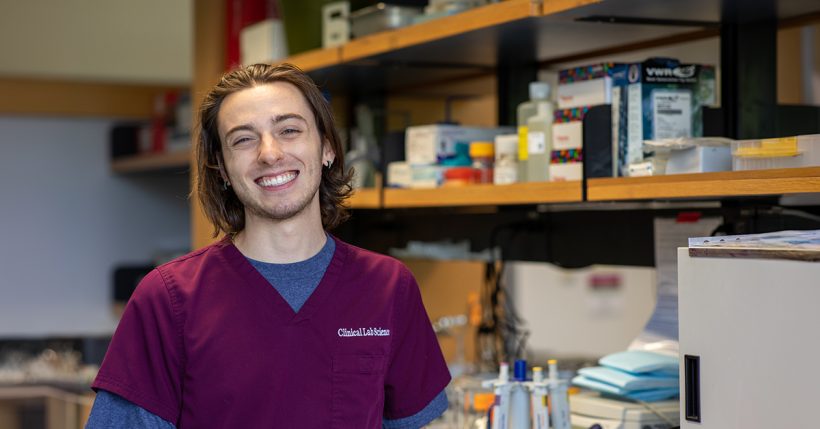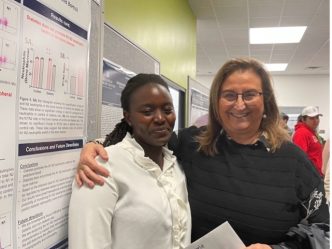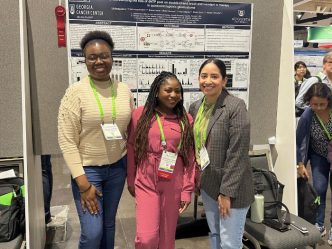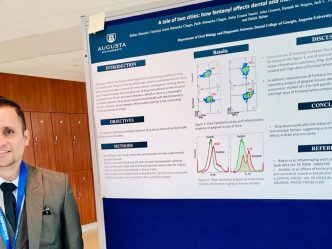Gaige Watkins is pursuing his Master of Science in Clinical Laboratory Sciences (MS-CLS) at Augusta University, bringing a strong dedication and passion for laboratory science to his studies. His academic journey is marked by a deep commitment to advancing medical testing and improving patient care. We had the opportunity to sit down with Gaige and learn more about his inspirations, research, and experiences in the MS-CLS program.
Inspiration Behind the MS-CLS Path
Gaige’s decision to pursue an MS in Clinical Laboratory Sciences was fueled by his desire to do more in the laboratory setting. “I was working in a toxicology lab before applying here at AU for the MS-CLS program,” Gaige explains. “I wanted to do more in the laboratory setting, but I needed more certification to be able to do what I wanted.” With a clear goal in mind, Gaige hopes his work will significantly impact his community. “I hope that I can impact my community by finding new tests that can yield quicker results for providers and patients.”
Innovative Research with Patient Benefits
Gaige’s research focuses on a crucial area in laboratory science—disaggregating platelet clumps. “I am researching ways to disaggregate platelet clumps,” he says. His research, conducted at WellStar MCG, involves vortexing samples that flag for platelet clumps in the hopes of breaking them apart. Platelet clumps can be caused by various factors, including hematologic diseases and autoantibodies reacting in EDTA tubes. Currently, when patient samples show platelet clumps, a redraw is required. Gaige’s goal is to help resolve these clumps, thereby preventing unnecessary redraws and improving the efficiency of patient care.
Advice for Aspiring Clinical Laboratory Scientists
For those considering a graduate degree in Clinical Laboratory Sciences, Gaige offers some advice: “You need to be committed to putting in the work for each discipline. All the disciplines in the CLS program are extremely difficult but doable.” He emphasizes the importance of understanding how diseases are identified in the lab, the tests used to confirm them, and the type of media required to cultivate pathogens. “You have to invest the time and effort,” Gaige advises, underscoring the dedication needed to succeed in this demanding field.
Outside of his academic pursuits, Gaige has a surprising hobby—playing the saxophone. “I loved playing the saxophone during high school and enjoyed playing jazz,” he reveals. Creative hobbies can provide a balance to rigorous studies, allowing students like Gaige to express themselves in different ways.
Memorable Moments at Augusta University
Reflecting on his time at Augusta University, Gaige shares a memorable experience from one lab in particular. “One of my most memorable experiences was in the hematology lab where the whole class stopped to have a debate with our professor about the color of a cell,” he recalls. The lively debate centered around whether a white blood cell was pink, purple, or gray. “Our professor Mr. Rice was saying that the cell was pink, while everyone in class was saying it was purple. I was the only odd man out thinking that the cell was gray.” This moment not only highlights the engaging learning environment at AU but also the camaraderie among students and faculty.
Conclusion
Gaige’s journey in the MS-CLS program at Augusta University is marked by his dedication to advancing laboratory science and his commitment to improving patient care. From his innovative research on platelet clumps to his memorable experiences in the classroom, Gaige is making the most of his time at AU. His story serves as an inspiration to others in the field, demonstrating the impact that passionate, driven individuals can have in the world of clinical laboratory science.
 Augusta University
Augusta University




